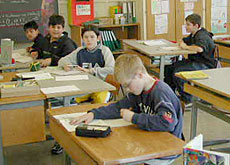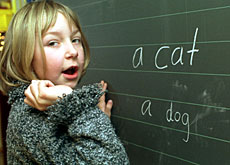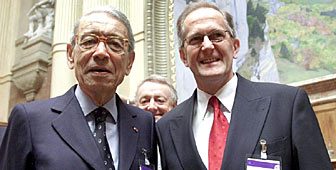Multilingual Switzerland – an affordable luxury?
English plays an increasingly vital part in the school curriculum across Switzerland - often at the expense of the national languages.
The Swiss Academy of Social Sciences has stressed the importance of preserving Switzerland’s linguistic diversity.
Economist François Grin told delegates at the Academy’s one-day conference in Biel, that moves to introduce English tuition in schools at an earlier age posed no real threat as long as Switzerland continued to invest in its national languages.
Last week eight German-speaking cantons announced plans to start teaching English to children two years earlier than French.
Grin said that although the real costs of maintaining a system of more than one language were unclear – no extensive study has been carried out – he believed they were surprisingly small when the benefits were taken into account.
“The value of [linguistic] diversity must be thought of along the same lines as the value of environmental quality or assets,” he said.
“There was a time when those assets were not valued greatly… but now we have learned to be more careful and more attention is being focused on the environmental impact of decisions we make.”
Grin also believes Switzerland’s multilingual tradition is part of its national identity and there will be an increasing awareness of the value in linguistic diversity.
“The Swiss define themselves by their very diversity,” Grin told swissinfo. “There is no problem with English becoming the preferred second language in schools, as long as people remain aware of the value and relevance of learning at least one other national language.”
Legal protection
Protracted discussions have been taking place over the past couple of years to draft a new law to promote the teaching of the four national languages in Switzerland.
Roland Ris, president of the Academy, says the law also aims to determine the rights of the different linguistic communities – especially in the bilingual cantons – and to define officially where different languages are spoken.
But he admits that the proposals fail to address the issue of how and where English should be used and taught.
“It is too delicate a subject to be incorporated within any draft,” he told swissinfo. “French-speaking Switzerland in particular is against emphasising the importance of English in schools over and above German – a situation which is not mirrored in German-speaking cantons.”
Ris maintains that German-speaking cantons should be encouraged to place more emphasis on French rather than English as a second language.
But as each canton sets its own education policy, many German-speaking are now opting for English as the first foreign language.
Global power struggle
While the possible choice of English as a second language in schools is seen by many as divisive and a challenge to Switzerland’s national cohesion, Grin believes the real danger lies not on a national level, but an international one.
People whose first language is English often head international organisations and businesses.
“The problem of giving any language the favoured status as the means of communication between people who speak different languages is the transfer of power it implies,” he said.
“It is not only power, but influence and money in the direction of native speakers of the language in question.”
But Grin remains confident that Switzerland will maintain its tradition of being a multilingual country, even though the influence of English is likely to grow.
“I think Switzerland has withstood the test of time,” he said. “There is a need for a more cohesive policy, but I think things come in their own good time.
“I hope that people will have the good sense to realise that certain things need to preserved and promoted – and one of those things is linguistic diversity.”
swissinfo, Jonathan Summerton
Almost 64 per cent of Swiss speak German, 19.5 per cent French, 6.6 per cent Italian and less than 0.5 per cent Romansh.
Over 9 per cent of Swiss have another language as their mother tongue compared with 0.5 per cent in 1950.
A draft law aims to promote and protect Switzerland’s four national languages.
Eight German-speaking cantons plan to start teaching English earlier than French.

In compliance with the JTI standards
More: SWI swissinfo.ch certified by the Journalism Trust Initiative



You can find an overview of ongoing debates with our journalists here . Please join us!
If you want to start a conversation about a topic raised in this article or want to report factual errors, email us at english@swissinfo.ch.